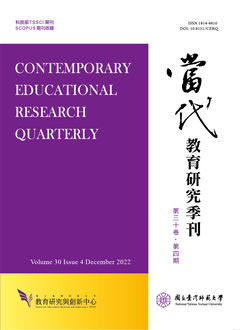

社會應當要如何影響個體,以便使他的能力得到陶冶,進而又能貢獻所 學,促進社會進步,當中所隱含的個人與社會如何互動的問題,一直是教育 中的重要課題,因為偏重個體,容易忽略了他的社會責任;過於強調社會又 會限制個人能力的發展。因此,如何使個體與社會得到同樣的重視,就有必 要加以探討。為釐清這個問題,本文以Wilhelm Rein(1847-1929)的理念 學說(Ideenlehre)為例,呈現社會中的不同系統如何影響個體,使他展現 不同系統所要求的行為規範。但由於Rein 偏重在社會系統對個人影響的陳述,缺少個人如何回饋社會系統的討論,因此本文要藉由Johann Wolfgang von Goethe(1749-1832)、Georg erschensteiner(1854-1932)以及Eduard Spranger(1882-1963)等人對於主體與客體、個人與社會系統間具有辯證發展關係的觀點,補充Rein 理念學說不足之處。因此本文研究目的包含了:一、呈現Rein 理念學說如何在個人德行能力陶冶,以及與社會道德提升二者間取得平衡;二、討論並補充Rein 的理念學說,使其論述內容更有依據;三、由上述修正了的理念學說,衍生在教育上的意義。為達成這三項目的,將以詮釋學作為研究方法。 綜合本文討論內容,可以達成如下的結論:一、在修正了Rein 的理念學說之後,能夠以此為基礎,說明為何透過教育歷程,可以使個人能力陶冶與社會發展二者間,同時得到提升;二、可以以Rein 修正後的學說為依據,說明應當要在教育過程中,同等重視個人與社會這二個面向;三、能由Rein修正後的學說,顯現培養學生批判與反省社會規範能力的重要性。
The relationship between individuals and the society, that is how socialized individuals interact with the society and contribute for the improvement of the society, has long been considered one of the most important issues in education. Any unilaterally favored treatment, placing more emphasis on either individuals or the society, may lead to impasse. Therefore it is central to consider how both aspects of the question can come to terms with each other in education. This article aims to explain the relationship between the individual and society on the base of Rein’s Doctrine of Ideas. After pointing out that ein’s account is insufficient for responding to this question, particularly as it relates to the individual’s ability to feedback to the society, I argue that in order to fully address the issue, we can take into account the thoughts of Goethe, Kerschensteiner and Spranger. They draw attention on the dialectical relationship between subject and object, and between the individual and the external world. Methodologically, the argument of this article proceeds with a hermeneutic approach as follows: first it outlines Rein’s theory in terms of how it explains the promoting of individual autonomy can be in accordance with social orders; then it draws attention to what Rein’s theory fails to adequately treat; and finally it proposes a modified thinking which enables a better respond to the question. A conclusion to respond to the relation between individuals and the society is discussed, by adapting Rein’s theory so as to show that the promotion of critical thinking and the maintenance of social orders are compatible, and both of which belong to the task of education simultaneously.

本著作係採用創用 CC 姓名標示-非商業性 3.0 台灣 授權條款授權.
本刊國立台灣師範大學教育研究與創新中心
106台北市和平東路一段162號 | 電話: 02-7749-3670 | E-mail: cerecerq@gmail.com
教創中心 | 師大 | 電子報 | 線上投審系統
本刊由國家科學及技術委員會人文社會科學研究中心補助經費
© 2014 CERI-NTNU
